-
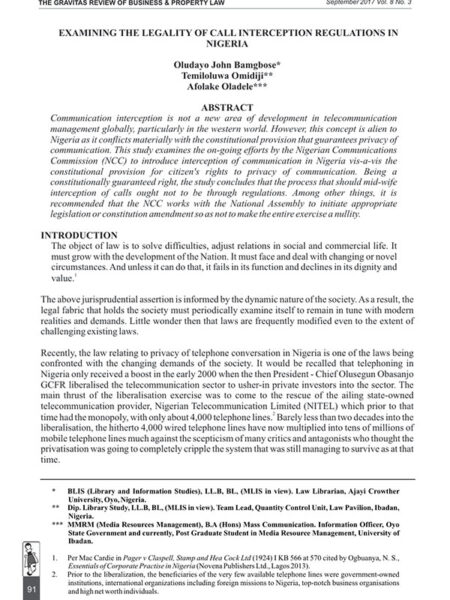
Examining the Legality of Call Interception Regulations in Nigeria
0₦2,500.00Oludayo Bamgbose (Law Librarian, Ajayi Crowther University), Temiloluwa Omidiji (Quantity Control Unit, Law Pavilion) and Afolake Oladele (Information Officer, Oyo State Government) in their article, “Examining the Legality of Call Interception Regulations in Nigeria” appraise the on-going efforts by the Nigerian Communications Commission (NCC) to introduce Regulations for interception of communication in the country. Bamgbose et al argue that while lawful interception of communication is commonplace even in advanced democracies to prevent, and aid investigation of crimes including terrorism, the current efforts by the NCC will have to contend with the constitutional provision protecting telephone conversations and telegraphic communications. In the end, the NCC may be unable to achieve its objectives with a Regulation, without an amendment of the constitution, or enactment of a law that is reasonably justifiable in a democratic society.
-
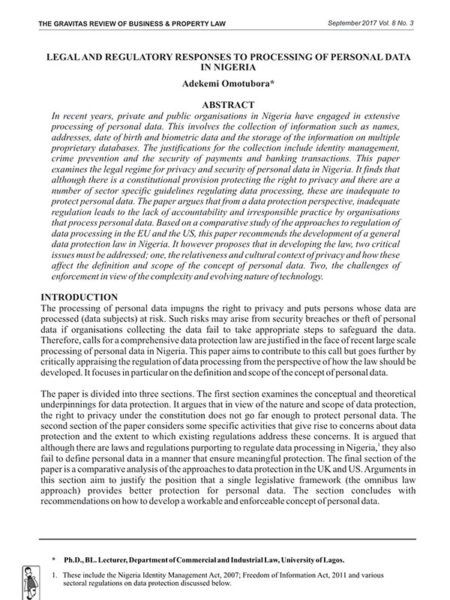
Legal and Regulatory Responses to Processing of Personal Data in Nigeria
0₦2,500.00Dr. Adekemi Omotubora, Lecturer, Department of Commercial and Industrial Law University of Lagos, in her article, “Legal and Regulatory Responses to Processing of Personal Data in Nigeria”, considers the justifications for collection of personal data which include identity management, crime prevention and the security of payments and banking transactions. She argues that although there is a constitutional provision protecting the right to privacy and there are a number of sector specific guidelines regulating data processing, there is no general data protection law in Nigeria, and this leads to a lack of accountability and irresponsible practice by organisations that process personal data. Based on a comparative study of the approaches to regulation of data processing in the EU and the US, she recommends the development of a data protection law in Nigeria, such law taking into consideration the relativeness and cultural context of privacy, and how these affect the definition and scope of the concept of personal data.
-
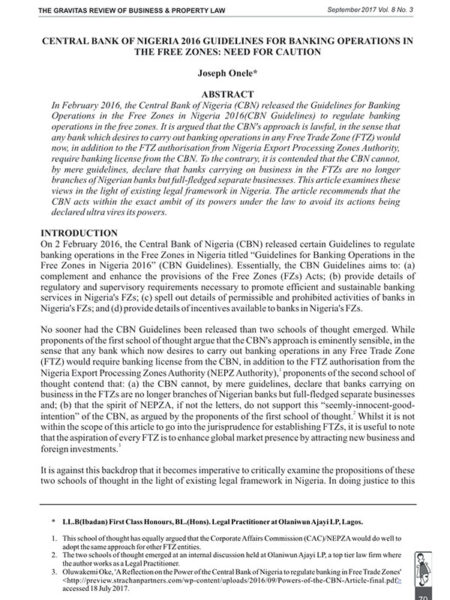
Central Bank of Nigeria 2016 Guidelines for Banking Operations in the Free Zones: Need for Caution
0₦2,500.00Joseph Onele, Legal Practitioner, Olaniwun Ajayi LP in his article “Central Bank of Nigeria 2016 Guidelines for Banking Operations in The Free Zones: Need for Caution”, analyses the CBN Guidelines vis-à-vis the provisions of the Bank and Other Financial Institutions Act (BOFIA), and the Nigeria Export Processing Zones Act. Would branches of a bank with valid banking license be able to operate in the free trade zones or would an existing branch of a bank have to become a subsidiary of the parent bank to be able to operate? Can the CBN by its Guidelines extend the frontiers of BOFIA? Onele in his usual inimitable style considers all sides of the argument and urges a need for caution.
-
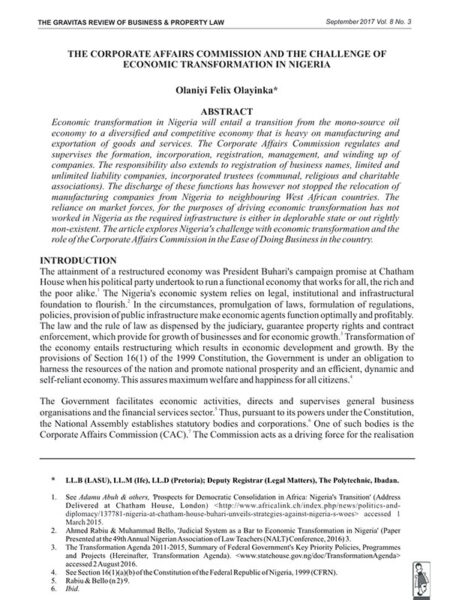
The Corporate Affairs Commission and the Challenge of Economic Transformation in Nigeria
0₦2,500.00Dr. Olaniyi Olayinka, Deputy Registrar (Legal Matters), The Polytechnic, Ibadan in his article, “The Corporate Affairs Commission and the Challenge of Economic Transformation in Nigeria” explores Nigeria’s efforts at economic transformation and the role of the Corporate Affairs Commission in the Ease of Doing Business in the country. He examines the philosophy, legal basis and challenge of economic transformation in the country. He concludes that the CAC has fared badly in leading the private sector to transform the economy because its ability is circuitously dependent on the strength of the nation’s economy which is ‘under the weather’.
-
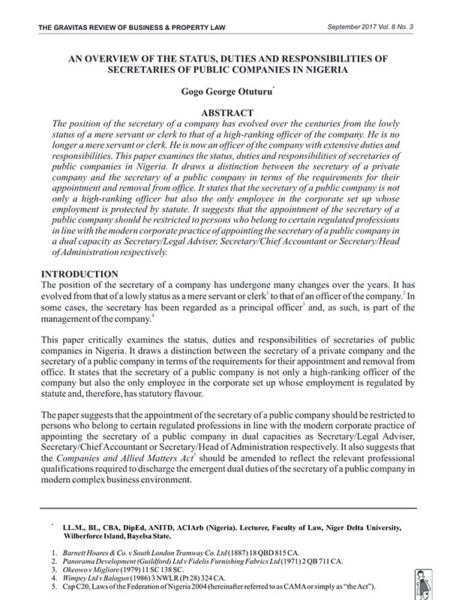
An Analysis of the Powers of the Corporate Affairs Commission in Investigation of Companies
0₦2,500.00Professor Abiodun Amuda-Kannike SAN, in his article, “An Analysis of the Powers of The Corporate Affairs Commission in Investigation of Companies” considers the enormous powers of the Corporate Affairs Commission under the Companies and Allied Matters Act to investigate the affairs of any company it suspects of being run detrimentally to the interest of its members, or of the general public. He gives a background to the investigative powers of the Commission, practical steps to be taken to trigger an investigation, and the legal value of a report prepared by an inspector appointed by the Commission.
-

An Overview of the Status, Duties and Responsibilities of Secretaries in Public Companies in Nigeria
0₦2,500.00Gogo Otuturu, Lecturer, Faculty of Law, Niger Delta University, Wilberforce Island, Bayelsa State, provides “An Overview of the Status, Duties and Responsibilities of Secretaries of Public Companies in Nigeria”. He draws a distinction between the secretary of a private company and the secretary of a public company in terms of the requirements for their appointment and removal from office. He notes that the secretary of a public company is not only a high-ranking officer but also the only employee in the corporate set up whose employment is protected by statute. He posits that the modern corporate practice of appointing the secretary of a public company in a dual capacity as Secretary/Legal Adviser, Secretary/Chief Accountant or Secretary/Head of Administration should lead to a rethink of the qualifications of the secretary of a public company.
-
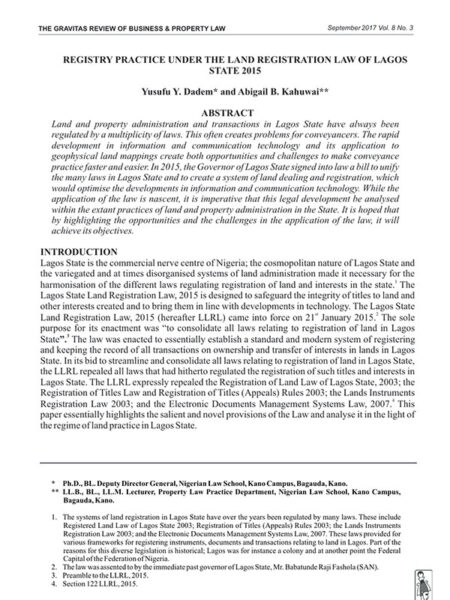
Registry Practice under the Land Registration Law of Lagos State 2015
0₦2,500.00Dr. Yusufu Dadem, Deputy Director-General, and Abigail Kahuwai, Lecturer at the Nigerian Law School, Kano Campus in their paper “Registry Practice under the Land Registration Law of Lagos State 2015” examine the Land Registration Law of Lagos State(LLRL) which repealed the Registration of Land Law of Lagos State, 2003; the Registration of Titles Law and Registration of Titles (Appeals) Rules 2003; the Lands Instruments Registration Law 2003; and the Electronic Documents Management Systems Law, 2007. Dadem & Kahuwai note that the variegated and disorganised systems of land administration made the LLRL imperative, for harmonisation of the different laws regulating registration of land and interests in the state. They analyse the provision of the law with respect to registration of interests, land register, records, and use of forms for transaction.
-
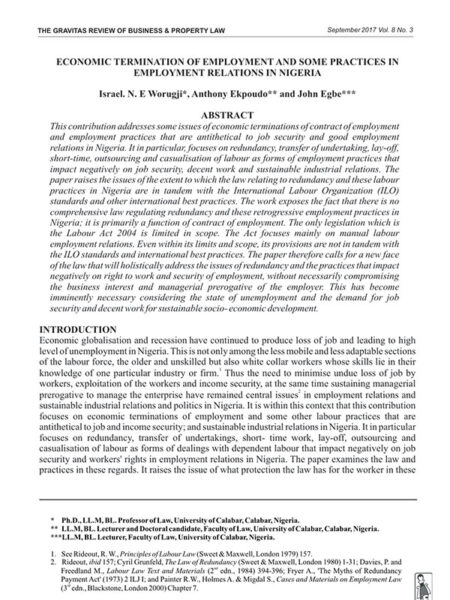
Economic Termination of Employment and some Practices in Employment Relations in Nigeria
0₦2,500.00Professor Israel Worugji, Anthony Ekpoudo and John Egbe, all of the University of Calabar in their article, “Economic Termination of Employment and Some Practices in Employment Relations in Nigeria” examine some issues of economic terminations of employment and practices that are antithetical to job security and good employment relations in Nigeria. They examine the legal framework for redundancy, transfer of undertakings, lay-off and short-time work, outsourcing and casualisation. They argue that the inadequacies of the Labour Act, and its focus on manual labour makes it short of ILO standards and international best practices. They call for a new face of the law that addresses the practices that impact negatively on the right to work and security of employment, without necessarily compromising the business interest and managerial prerogative of the employer.
-
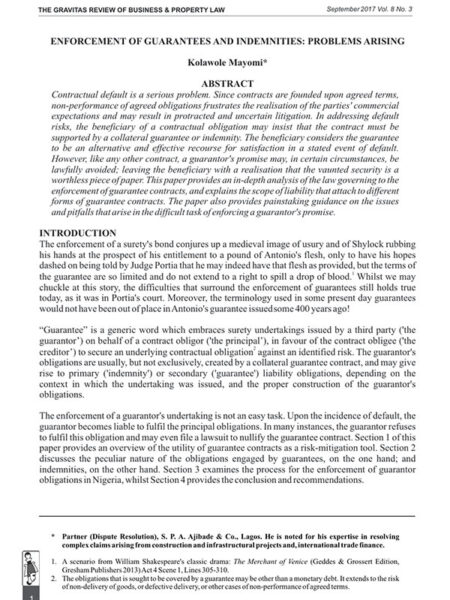
Enforcement of Guarantees and Indemnities: Problems Arising
0₦2,500.00Kolawole Mayomi, Partner S.P.A. Ajibade & Co in his article, “Enforcement of Guarantees and Indemnities: Problems Arising” provides an in-depth analysis of the law relating to guarantees and indemnities. He notes that while the law relating to guarantee and indemnity contracts in Nigeria is case driven, the courts have conflated the principles undergirding them. The consequences being opening up a guarantor to unconditional liability or imposing onerous obligation on the creditor holding an indemnity contract. He examines how risks are covered, the difference between guarantee and indemnity contracts, and grounds for resisting enforcement of each.
-
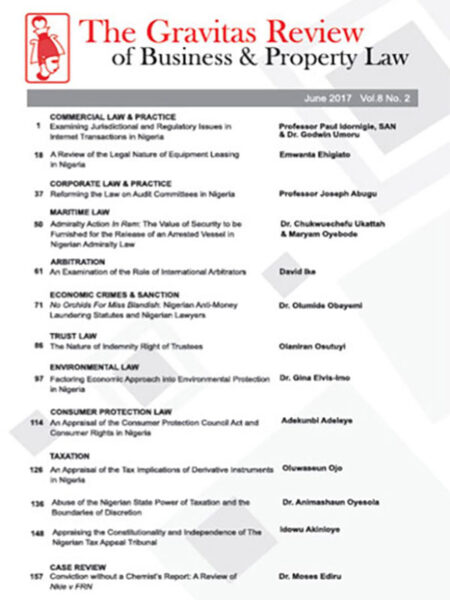
The Gravitas Review of Business & Property Law Vol.8 No.2 – Print
0₦5,000.00In this issue of The Gravitas Review of Business & Property Law Vol.8 No.2, there are well researched articles on:
- Commercial Law & Practice
- Corporate Law & Practice
- Maritime Law
- Arbitration
- Economic Crimes & Sanction
- Trust Law
- Environmental Law
- Consumer Protection Law
- Taxation
- Case Review
-

The Gravitas Review of Business & Property Law Vol.8 No.2 – E-Book
0₦5,000.00In this issue of The Gravitas Review of Business & Property Law Vol.8 No.2, there are well researched articles on:
- Commercial Law & Practice
- Corporate Law & Practice
- Maritime Law
- Arbitration
- Economic Crimes & Sanction
- Trust Law
- Environmental Law
- Consumer Protection Law
- Taxation
- Case Review
-

The Gravitas Review of Business & Property Law Vol.8 No.2
0₦5,000.00In this issue of The Gravitas Review of Business & Property Law Vol.8 No.2, there are well researched articles on:
- Commercial Law & Practice
- Corporate Law & Practice
- Maritime Law
- Arbitration
- Economic Crimes & Sanction
- Trust Law
- Environmental Law
- Consumer Protection Law
- Taxation
- Case Review
The Gravitas Review of Business & Property Law



